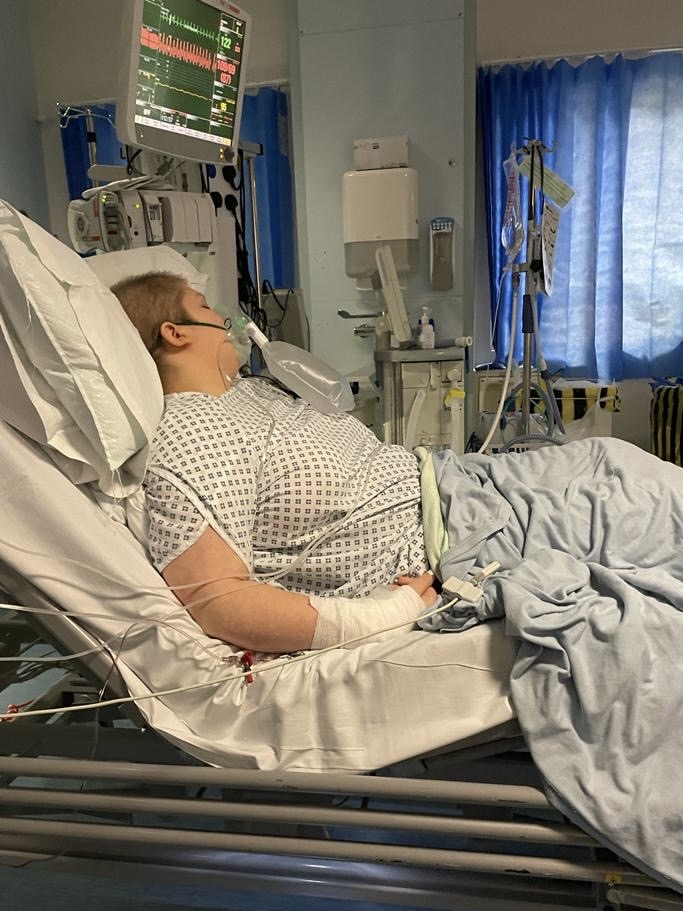How I found out I had tongue cancer
Rachel
Rachel was diagnosed with tongue cancer aged 19 while studying medicine at university. She shares her tongue cancer diagnosis story, talking through her symptoms and her experience since being diagnosed – including how her nurse Fiona and Youth Support Coordinator Nicola have helped her.
Getting diagnosed
The main symptom I had was non-resolving mouth ulcers, which started in 2019. I’d been to the GP a few times, but I was seeing lots of different doctors, and it was harder to get face-to-face appointments when covid began.
Then I started getting really tired. It was my second year of university, and I was just coming in every day and falling asleep. I also started getting rashes all over my lips about once a week.
Because I’d moved to Edinburgh, I had a new GP. I told her about my symptoms over the phone, and she brought me in, did an examination, and said “I think you need to go for a biopsy”. Within one week, I had my biopsy and I was diagnosed with advanced oral squamous cell carcinoma (tongue cancer).
I remember the whole thing really well. I sort of had it in my head that it was going to be cancer. The doctor who did my biopsy had said he thought it could be due to something like Crohn’s disease, but I knew it wasn’t that.
I had my biopsy on the 11th of December 2020, and they called back on the 17th saying they needed to see me straight away. My mum came to the appointment with me the next day, and the doctor had a box of tissues set out, so I just knew. I think because I’d been so mentally prepared, I just sat there and I was like “OK”, and my mum was more upset than I was.
Before my diagnosis, I’d been investigated for lots of random stuff like iron overload disorders, I’d had multiple GP appointments and blood tests, and been referred to the dentist. But because I didn’t have anything like dramatic weight loss, and because the type of cancer I had is rare in people my age, cancer wasn’t really considered as a possibility.
I’m not your ‘typical’ tongue cancer patient – I’m not someone who’s drunk and smoked for the last 40 years.
I had to have about ten different surgeries at once, so the surgery ended up being about 16 hours long. They found that about two-thirds of my tongue had become cancerous, into my jaw and down into my lymph nodes, so they had to remove all of that. They had to remove the blood supply as well because that can carry malignant cells.
Then they had to use some muscle and blood vessels from my legs to reconstruct my tongue and the arteries and veins in my neck. I had to relearn how to walk afterwards. On top of that, I couldn’t speak for a week because I had a tracheostomy in. I had to have lots of speech therapy and relearn how to speak and swallow.
We found out the cancer was quite aggressive, so I had to have radiotherapy and chemotherapy. I was admitted to the Edinburgh Teenage Cancer Trust unit. I only had two bouts of chemo, but I had radiotherapy every day for six weeks, so that was intense.
How Teenage Cancer Trust helped me
I first met my Clinical Nurse Specialist Fiona and Youth Support Coordinator Nicola when I had the consultation with my oncologist before starting chemo and radiotherapy.
Having Fiona and Nicola on the ward was a godsend. Every time I was in for treatment, I couldn’t have family and friends in, but I knew they would come and chat to me.
And when I was at home in between treatments, if I wasn’t coping great or any question I had, I could text one of them. I knew that they would do something about it, and it saved me calling up the hospital switchboard.
Even now when I have follow-up appointments, they’ll always make a point of coming to meet me in the waiting room. It’s so nice because they remember everything about you. It really makes a difference because you can tell they actually care about you as a person, as opposed to a medical case.
You can tell Teenage Cancer Trust actually care about you as a person, as opposed to a medical case.
My whole experience has made me trust my intuition more. I knew something was wrong and that’s why I kept going back to the doctor. I think it’s so important not to rule out cancer as a possibility just because the textbook says so. If it had been caught sooner, I may not have had to go through such extensive surgery and radiotherapy.
Head and neck cancer is rare in people my age but it happens, and it happened to me. You would never think I’d get cancer halfway through a medical degree.



